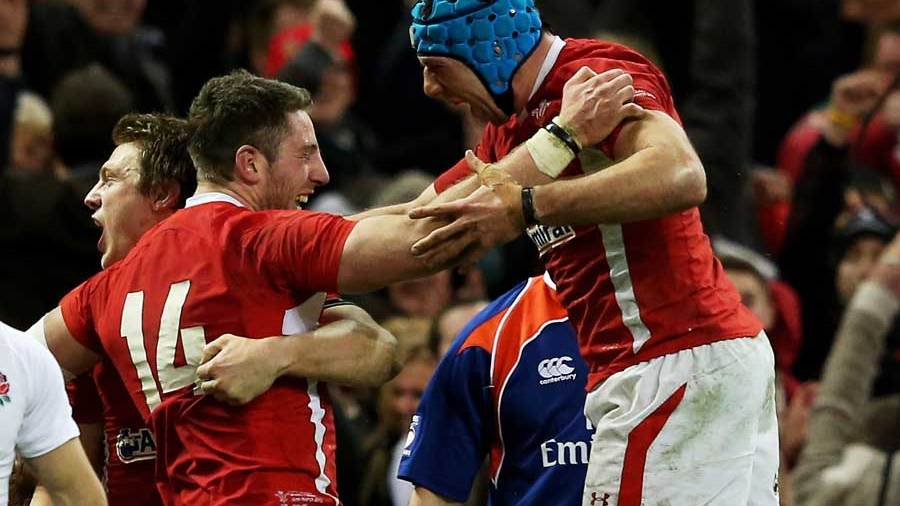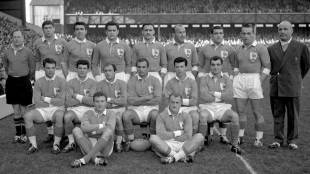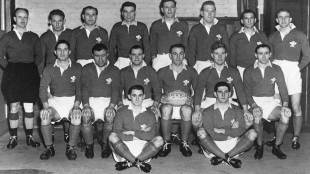|
Six Nations
Re-writing history: What if there were no shared winners?
Huw Richards
January 31, 2014

Wales are on the brink of history - but what if tie-breakers had always been there? © Getty Images
Enlarge
As so often, Warren Gatland is doing things a little differently. The conventional coach's playbook says that you talk down the possibility of making history when it is raised before a Six Nations tournament. But instead of insisting, as orthodoxy would demand, that Wales are focussed solely on their opening match against Italy, Gatland has been quite prepared to discuss their ambition of winning a third consecutive Six Nations title. It would, he pointed out at the media launch last week, be "a chance to make a bit of our own history" for a group of players who "have had the successes of the 1970s thrust down their throats". And it can be argued that it would be an unprecedented feat. Nobody in 131 years and various incarnations of the tournament has ever won three outright titles in a row. But, of course, the rules have changed in that time. Impressive though Wales' last two seasons have been, last year would only have been a shared championship under the rules as they operated until 1993. Whatever the dimensions of the demolition of England at the Millennium Stadium last March, Stuart Lancaster's men would have retained a half-share in the title.
All of which naturally leads on to a 'what if ?'. In this case, what if the points difference tie-breaker operated since 1994 had been in operation through the championship's history? One obvious objection is that teams might, on occasion, have behaved a little differently, so we can not assume that scores and results would have been the same. But if we suppose for a moment that scores would have been the same, it is possible to see Wales' ambitions in a historical perspective. Applying the 'what if ?' exercise to the pre-1993 championship and in particular to the 19 occasions when the title was shared shows that while a Welsh hat-trick would not be unprecedented, it would still be an exceptional feat, unmatched in almost half a century. Five teams achieved 'what if ?' hat-tricks. They were England from 1912 to 1914, Scotland from 1925 to 1927, Wales from 1954 to 1956, France from 1959 to 1962 and Wales again from 1964 to 1966. Strikingly the feat, counterfactual or not, was beyond the generally recognised great dynastic teams of the 48 years since - the 1970s Welsh team who clearly weigh to some extent on Gatland, the 1990s England team that the current Wales XV in some ways resembles and Clive Woodward's England. Aside from shedding light on Wales's potential achievement, this list of 'hat-tricks' also challenges some received opinions. For three of the teams it reinforces perceptions of greatness. The standing of the England team of 1912-14, featuring such imperishable talents as Ronald Poulton and Cherry Pillman and achieving consecutive Grand Slams immediately before the war was not in question.

The French team of 1959
© PA Photos
Enlarge
Scotland's place in the list confirms the existing impression that the 1920s was their Golden Age, particularly since they were also second in 1923 and champions in 1929. The 1925 Grand Slammers, with Smith and MacPherson scoring tries by the hat load, stand as the highest point amid a range of fine years rather than the single peak they can sometime look. And those Frenchmen of the late 1950s and early 1960s, the men who finally made the breakthrough of first title and went on and on winning, the era of Michel Crauste, Amedee Domenech and Pierre Albaladejo, really do now look like one of the great teams in championship history, the only one to have turned a 'what if ?' hat-trick into a four in four. But it is the Welshmen either side of those French teams who demand a re-evaluation. Both are seen in relation to apparently greater eras - the 1950s team as following on from the Grand Slammers of 1950 and 1952, those of the 1960s as forerunners of the unparalleled brilliance yet to come. But Wales teams led by Clive Rowlands and Alun Pask achieved a feat which, in terms of pure consistency, was beyond those of John Dawes and Mervyn Davies. The achievements of the first of those teams reinforces David Parry-Jones' argument that the first half of the 1950s deserves to be regard as a third Golden Age for the Welsh game, while taking the two teams together with what came before and after makes a strong case for adopting the French concept of the 'Trente Glorieuses' for the years from 1950-1979.

Could the 1950 crop of Wales players be the third Golden Age?
© PA Photos
Enlarge
Wales has reason to regret that points difference was not adopted from the start. Welsh teams shared 11 championships, including the five-way tie of 1973, but on all but two of these occasions - including 1973 - had the best points difference. One of the exceptions, when the title was shared with France in 1970, is the reason why the Dawes teams fell short of a 'what if ?' hat-trick. Had the tie-breaker always applied, Wales would lead England, which also shared 11 titles but had the best points difference in only two, by 35 championships to 28, instead of being tied 26-26. The other Welsh exception, in 1932, is still more notable as the only time in eight shared titles - including both 1926 and 1927 - that Ireland had the best points difference. Scotland had the edge over Ireland in both of those years, but in only one other - the first ever shared title, with England in 1886 - of the seven times it finished in joint first place. France, by contrast, would claim four extra titles from its seven shares had the rules been different. Of course they were not - and players can only play to the rules and conditions existing in their own time. But like other forms of counterfactual history, playing the 'what if' game can shed fresh light on both the real weight of modern achievement and the standing of perhaps under-recognised teams from the past. And it underlines the far from counterfactual point made by Gatland last week, that putting together a run of success in the championship is, and always has been, a tough, elusive achievement. © ESPN Sports Media Ltd
| |||||||||||||||
Live Sports
Communication error please reload the page.
-
Football
-
Cricket
-
Rugby
-
- Days
- Hrs
- Mins
- Secs
F1 - Abu Dhabi GP
Abu Dhabi Grand Prix December 11-131. Max Verstappen ()
2. Valtteri Bottas (Mercedes)
3. Lewis Hamilton (Mercedes)
4. Alexander Albon ()
5. Lando Norris ()
6. Carlos Sainz Jr ()
-
ESPNOtherLive >>
Snooker - China Open
Tennis - Miami Open

